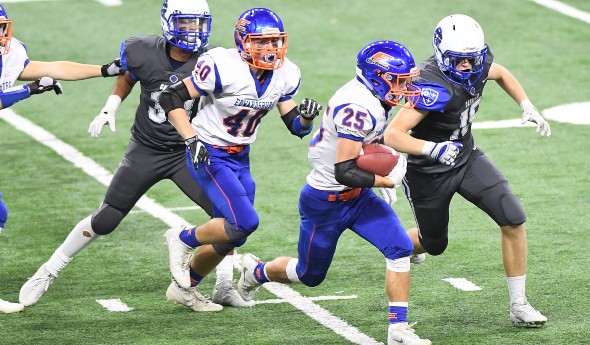
Heads and Heat
August 16, 2012
We are engaged in very serious discussions. They’re not only complicated, with unintended negative consequences possible from what are thought to be positive actions; they’re also a matter of life and death.
The topic is football – the high school sport under most scrutiny today and suffering from the most criticism it’s seen since the 1970s when catastrophic neck injuries spiked, liability awards soared, many insurers balked, and most helmet manufacturers abandoned the business altogether.
During recent years we have learned about the devastating long-term effects of repeated blows to the head; and we’re trying to reduce such hits. We’ve learned that 70 percent of concussions in football result from helmet-to-helmet contact, and we’re trying to have coaches teach blocking and tackling differently and have officials penalize “high hits” consistently and rigorously.
During the past several years we’ve learned that serious heat illness and heat-related deaths are 100 percent preventable, yet nationwide there were 35 heat-related deaths in high school football alone from 1995 to 2010; and we’re promoting practices that acclimatize athletes more gradually than “old school” traditionalists might advocate.
As we simultaneously address issues of heads and heat in football, some coaches may think we’re being overbearing, while many in medical fields say we’re out of date, citing higher standards of the American Academy of Pediatrics, National Athletic Trainers Association and National Federation of State High School Associations, as well as many of our counterpart organizations across the country.
As we consider in-season changes to improve athlete acclimatization and reduce blows to the head, we should be open to making out-of-season changes that work toward rather than in opposition to those objectives. There can be no sacred cows. The topic is too serious.
Ultimately, if we err in the outcome of this year’s discussions about heads and heat in football, it must be on the side of safety, on minimizing risks for student participants. They deserve it and, once again, the sport of football needs it.

Moment: Goggins, Scott Go Distance
November 26, 2020
By John Johnson
MHSAA Director of Broadcast Properties
A few weeks back, we highlighted one of two of the “longest play” records in the MHSAA Football Finals where there’s a tie for the top spot – longest rushing play. Today, we feature the longest kickoff returns in the history of the games.
The longest kickoff return you can record in high school football is 99 yards, and that’s what Caden Goggins of Edwardsburg did in the 2017 Division 4 11-Player Football Final against Grand Rapids Catholic Central to tie a Finals game record with Tommy Scott of Muskegon Catholic Central, who accomplished the same against Munising in the 2014 Division 8 title game.
Goggins’ runback came in a game where he said “top that” to the other mammoth scoring plays – runs of 54, 55, 64, 79 and a Finals-record 90 yards.
Grand Rapids Catholic Central had just scored on its first possession of the second half to take a 28-13 lead. Goggins found daylight on the ensuing kickoff and was off to the races. “I saw the hole and just took off,” he told the South Bend Tribune after the game.
The pesky Eddies kept nipping at the heels of the Cougars all night long, getting within four points at 35-31 midway through the final period. But in the end, the Grand Rapids team prevailed, 42-31. Goggins would bring Edwardsburg back to Ford Field the next year, rushing for 125 yards and two touchdowns in a 28-7 win over Chelsea.
As for Scott, his 99-yard streak sent a second shock wave through the crowd after Munising had torched the Crusaders secondary for a 79-yard touchdown pass just 13 seconds earlier.
"It was huge to get the momentum right back after they took the momentum in the first three plays," Scott told the MHSAA Second Half after the game. "Making a big play like that can change a game."
Scott wasn’t finished. After being held to 14 yards rushing in the first half, he scored three second half touchdowns as MCC broke things open and won, 31-6. Scott finished the game with 92 yards on the ground.
Scott’s TD return broke the previous record of 97 yards by Brad Mesbergen of Zeeland West in the 2011 Division 4 Final.

